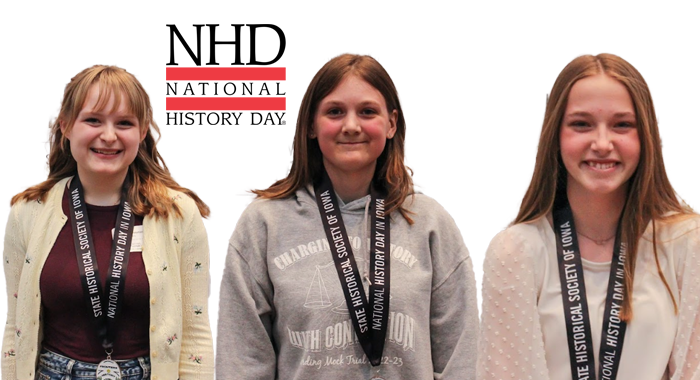8th grader Evaline Petersen (Franklin), 8th grader Katie Hubbs (Harding), and 7th grader Raegan Reicks (Harding) took home top honors in the Iowa National History Day Competition early this spring. In June, they will travel to Washington DC to compete in the National History Day National Contents against nearly 3,000 students from around the United States.
National History Day is an annual competition for middle and high school students. Students must pick a topic and then research, write papers, and present exhibits, documentaries, websites, and/or performances about their topic. This year’s projects had to fall under the theme: “Frontiers in History: People, Places, Ideas.” Through the competition, students learn critical thinking and problem-solving skills, research and reading skills, oral and written communication skills, and presentation skills.

Evaline Petersen, a Franklin 8th grader, completed a research paper titled “American Quakers in WWII: A New Frontier in Immigration Legislation.” During WW II, Quakers in America ran a service group called American Friends Service Committee (AFSC). The group set up programs to help Jewish refugees the immigrated to America during the war, such as the one at the Scattergood Hostel in Iowa. They helped the refugees acclimate to the country, recover from their recent ordeal in Europe, improve their English, learn to drive a car, find work, and helped them find permanent homes. They also helped to sway public opinion towards progressive immigration laws. Along with moving on to nationals, Evaline won the History of the Holocaust Award from the Jewish Historical Society of Des Moines.

Harding 8th grader Katie Hubs did a project on “The Manhattan Project: The Explosive Route to Nuclear Science” In her performance detailed the research that started in the United States in 1942 with the goal of developing the first atomic bomb. The Manhattan Project created a new frontier in science and refined our knowledge of nuclear science and engineering. It also paved the way for future generations to utilize nuclear energy for other purposes.

Finally, Harding 7th grader Raegan Reicks performed her 10-minute play titled “Striding Toward Justice: How the Nuremberg Trials Were a Frontier in International Law.” After the Allies were left reeling from the blatant violence in the Holocaust, Jews called for Britain, the United States, France, and the Soviet Union to honor their promise, from the 1943 Moscow Agreement, to avenge the Jewish people. This eventually led to the Paris Agreement and Charter of 1945, a frontier in history as the first-ever legal document to officially outline international law.
